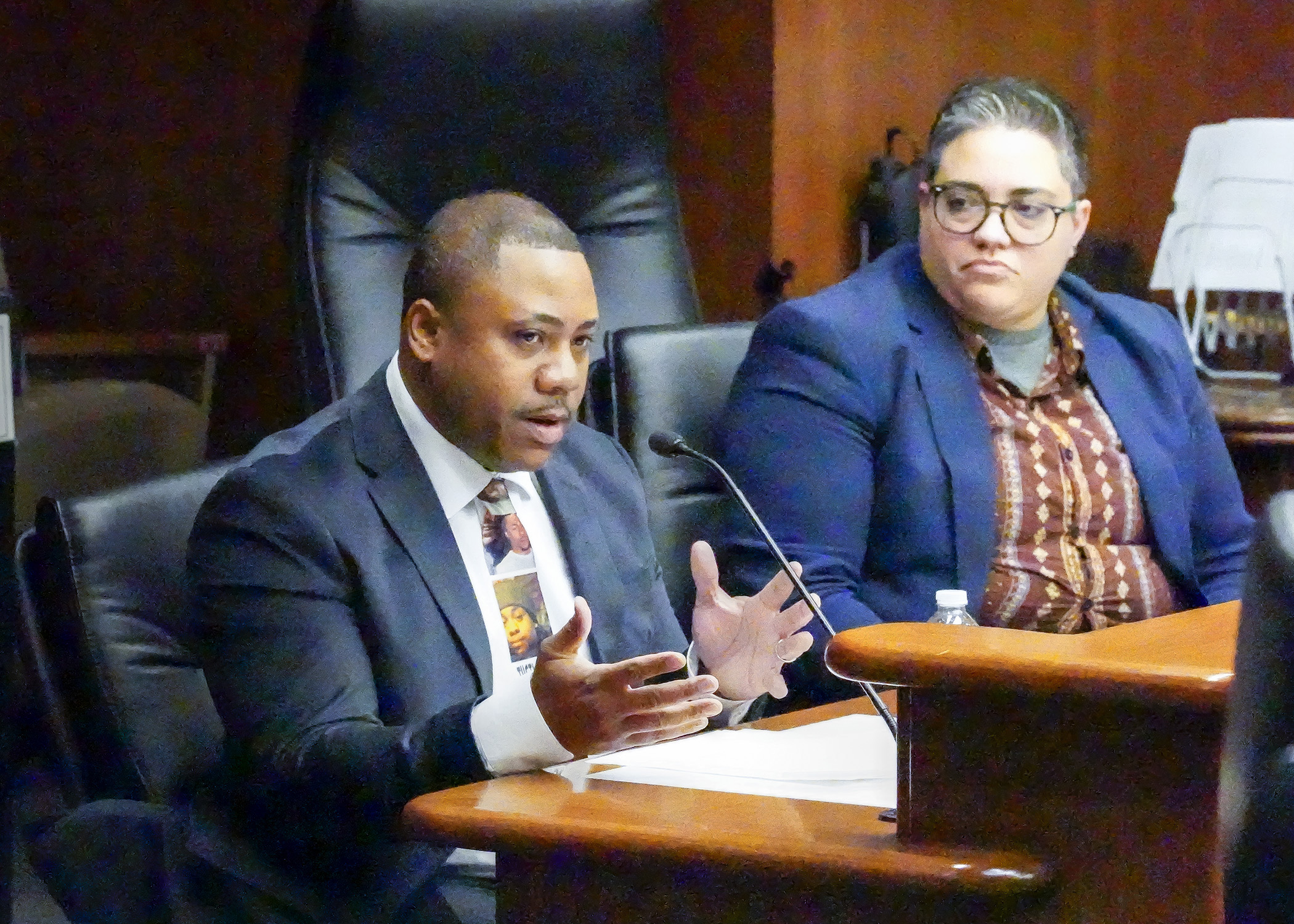Public safety panel advances bill to prohibit no-knock warrants

Andre Locke spoke from the heart about his son, Amir, to a hushed committee room Wednesday evening.
“Amir was a beautiful 22-year-old man with his whole life to be lived and we will never know how his contributions could have made the world a better place.”
Police shot and killed Amir Locke on Feb. 2, 2022, nine seconds after entering a downtown Minneapolis apartment while executing a warrant in which he wasn’t named, and that didn’t require police to knock and give any occupant a chance to open the door.
“We’ve seen over and over again across the country ways in which these raids result in unnecessary damage, injury, and death,” Locke said. “We call on our leaders to do the right thing and eliminate or significantly restrict this militaristic approach to policing our communities.
“We now fight for justice in his name and hope meaningful change will be his legacy.”
Rep. Brion Curran (DFL-Vadnais Heights) sponsors HF2290 that would prohibit a court from issuing or approving a no-knock warrant.
“Minnesotans have a constitutional right to privacy and to defend themselves in their home, which no-knock warrants unnecessarily infringe upon,” she said.
The House Public Safety Finance and Policy Committee approved the bill, as amended, on an 8-5 party-line vote and sent it to the House Judiciary Finance and Civil Law Committee.
A former police officer, Curran has a personal perspective on the practice of no-knock warrants.
She said the use of no-knock warrants – where police are not required to announce their presence before forcibly entering a property – are extremely dangerous for both the police and the people on the other side of the door.
Under current law, judges can approve such warrants under certain conditions, such as when the police can demonstrate they are unable to detain a suspect or search the residence through a knock-and-announce warrant.
Curran said she understands why police want to have the ability to execute no-knock warrants, but they needlessly “put the pursuit of justice above the lives of innocent bystanders.”
Republicans and some, but not all, groups representing law enforcement oppose the bill.
Rep. Jeff Witte (R-Lakeville) and Rep. Paul Novotny (R-Elk River) are both retired police officers. Both said no-knock warrants, when executed with care, should remain an option for law enforcement agencies.
They said surprise is a key element of a no-knock warrant, which permits offers executing them to prevent the loss, destruction, or removal of the objects of the search, such as evidence of a crime.
Novotny said legal restrictions already in place to limit the use of no-knock warrants means they are only executed when they absolutely needed and are made as safe as possible.
“They need to be rare, they need to be safe, and they should be legal,” he said.
The Minnesota Chiefs of Police Association, Minnesota Sheriffs’ Association, and Minnesota Police and Peace Officers Association sent a joint letter opposing the bill, stating: “The proposed language will limit the ability to protect those executing the lawful search warrant or the public while jeopardizing the preservation of potentially relevant investigatory evidence.”
However, the National Tactical Officers Association wrote in a statement: “No-knock search warrants, though well-intended, no longer pass the test of tactical science, risk mitigation practices, and liability-conscious decision-making.”
Related Articles
Search Session Daily
Advanced Search OptionsPriority Dailies
Speaker Emerita Melissa Hortman, husband killed in attack
By HPIS Staff House Speaker Emerita Melissa Hortman (DFL-Brooklyn Park) and her husband, Mark, were fatally shot in their home early Saturday morning.
Gov. Tim Walz announced the news dur...
House Speaker Emerita Melissa Hortman (DFL-Brooklyn Park) and her husband, Mark, were fatally shot in their home early Saturday morning.
Gov. Tim Walz announced the news dur...
Lawmakers deliver budget bills to governor's desk in one-day special session
By Mike Cook About that talk of needing all 21 hours left in a legislative day to complete a special session?
House members were more than up to the challenge Monday. Beginning at 10 a.m...
About that talk of needing all 21 hours left in a legislative day to complete a special session?
House members were more than up to the challenge Monday. Beginning at 10 a.m...